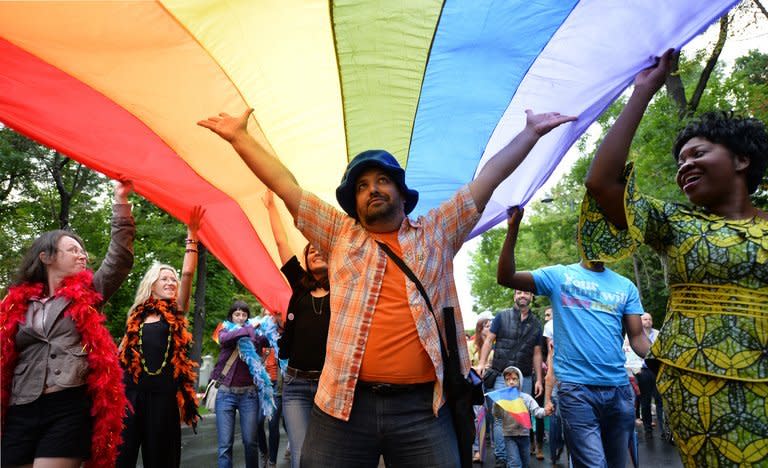Romania stages Gay Pride as same-sex marriage ban looms
Some 400 people took to the streets of Bucharest for a Gay Pride parade on Saturday but a controversial amendment to the constitution banning same-sex marriage overshadowed the event. "It is a sadder parade because of the amendment", Accept president Florin Buhuceanu told AFP, while lesbian, gay, bisexual and transgender (LGBT) activists and sympathisers waved rainbow flags in downtown Bucharest. Romanian lawmakers are discussing a constitutional amendment restricting the legal definition of marriage to a "union between a man and a woman". The article was proposed by the dominant Orthodox Church and accepted by a parliamentary committee tasked with amending the 1991 constitution. Centre-left Prime Minister Victor Ponta has called for a new vote in the committee, saying he does not see the need for a change to the current definition of marriage as "a union between spouses". Ponta pointed to neighbouring Hungary, where a similar amendment by Prime Minister Viktor Orban's right-wing government triggered sharp criticism from the European Commission, although he said he did not himself back same-sex marriage. "The MPs' amendment is an attempt to ban the family life of LGBT couples, but it can also affect single-parent or extended families," Buhuceanu said. "The controversy sparked by this article betrays the Romanian society's low level of tolerance to the LGBT minority and the need for public debates on this topic." Rights group Amnesty International too voiced concern over the move, stressing that every person has the right to set up a family, "without discrimination as to sexual orientation or gender identity". The chairman of Romania's Anti-Discrimination Council, Csaba Asztalos, said the amendment had "nothing to do with the wish to protect the family but only aims to signal that politicians share the voters' hatred of homosexuals." "This amendment shows that fundamental human rights are not fundamental and are not for everyone", Ovidiu, a 30-year-old engineer who participated at the Saturday parade together with his wife and four children, told AFP. Other participants held banners reading "Equal responsibilities, equal rights", "Love makes no discrimination" or "Love is not a crime". Britain's ambassador to Romania Martin Harris, United States charge d'affaires Duane Butcher and regional chief of the International Organisation of la francophonie David Bongard took part in the parade. Sexual minorities, members of the Roma community and people infected with HIV are the main victims of discrimination in Romania, opinion polls show. A poll conducted in 2011 found that 73 percent of Romanians would not like to have a homosexual among their relatives and 45 percent among their work colleagues. But Asztalos said Romanians were gradually becoming more tolerant. Earlier Saturday, about 100 people took part in a "normality march" organised by a small extreme right party to protest against homosexuality.



